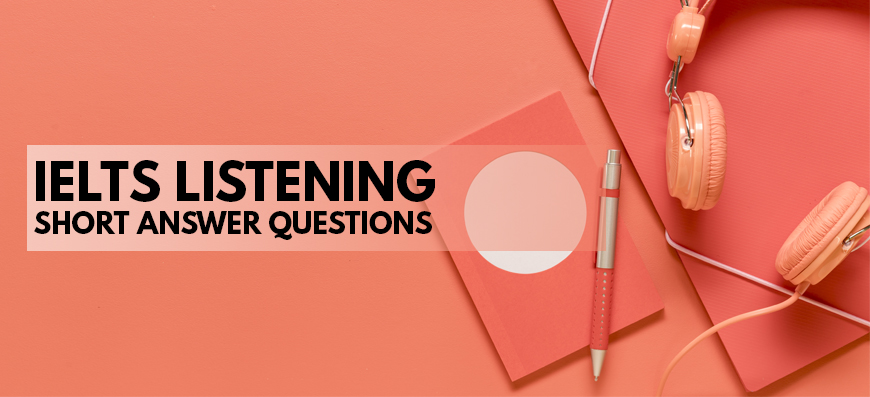The Long and Short of handling IELTS Listening Short Answer Questions

Having some short answer questions in an IELTS listening test is a certainty that you will have to encounter. For all its certainty and one of the most common question types, students have been getting their answers wrong in a lot of cases. The key to a successful IELTS listening test is to handle each question type with a distinct strategy that works well for the question type.
Having a general rule for all question types is a bad idea especially for the IELTS Listening test. So if you have been following general patterns and do not have a specific strategy for handling short answer questions, this blog can help you not only generate one but also practice it effectively to make you confident in handling such question types on D day.
Scan the questions before the audio plays out
Before the audio starts playing out, you are given time to read the questions. Instead of focusing on question types, take a look at the kind of questions that are being asked. Knowing the kind of information sought can help you listen far more attentively. The questions can be on who, what, when, where and why. For example, if the questions start with 'What' or 'When' you can be sure that the question is looking for an event and its possible date. Likewise 'how many' or how often' can often lead to a number as a possible answer. Check out the good sample test resource at FourModules to help you practice all such question possibilities and devise an apt strategy.
Focus on the keywords
Focusing on the important keywords in a question remains a constant strategy for many question types. For example, if you are hearing a conversation that is more academic in nature or has some terminology you are not aware of, keywords can help you join the dots without getting lost in deriving the meaning of the content.
Note the number of words sought
Short answer questions can seek one word or a number or two words or a number. Knowing the number of words sought is important. While this may seem elementary, many students commit the mistake owing to the pressure of timing. For example, if the answer is not more than two words or a number, a short answer question is a leather sofa, writing a sofa made of leather instead will be deemed as a wrong answer.
Beware of spellings
Unforced errors and spelling and grammatical mistakes often lead to many wrong answers. Unlike MCQ's where you are choosing options, writing answers in short answer question need apt focus on spellings and grammar. Practice your spellings by employing multiple IELTS Listening sample tests as listed here.
Practice reading, writing and listening at the same time
Reading the question before the audio, writing answers as the audio plays along and then moving the written answer to the answer sheet are all to be done in a time-bound manner. This requires apt practice and hence the focus on attempting apt sample tests as listed here.
Having a general rule for all question types is a bad idea especially for the IELTS Listening test. So if you have been following general patterns and do not have a specific strategy for handling short answer questions, this blog can help you not only generate one but also practice it effectively to make you confident in handling such question types on D day.
Scan the questions before the audio plays out
Before the audio starts playing out, you are given time to read the questions. Instead of focusing on question types, take a look at the kind of questions that are being asked. Knowing the kind of information sought can help you listen far more attentively. The questions can be on who, what, when, where and why. For example, if the questions start with 'What' or 'When' you can be sure that the question is looking for an event and its possible date. Likewise 'how many' or how often' can often lead to a number as a possible answer. Check out the good sample test resource at FourModules to help you practice all such question possibilities and devise an apt strategy.
Focus on the keywords
Focusing on the important keywords in a question remains a constant strategy for many question types. For example, if you are hearing a conversation that is more academic in nature or has some terminology you are not aware of, keywords can help you join the dots without getting lost in deriving the meaning of the content.
Note the number of words sought
Short answer questions can seek one word or a number or two words or a number. Knowing the number of words sought is important. While this may seem elementary, many students commit the mistake owing to the pressure of timing. For example, if the answer is not more than two words or a number, a short answer question is a leather sofa, writing a sofa made of leather instead will be deemed as a wrong answer.
Beware of spellings
Unforced errors and spelling and grammatical mistakes often lead to many wrong answers. Unlike MCQ's where you are choosing options, writing answers in short answer question need apt focus on spellings and grammar. Practice your spellings by employing multiple IELTS Listening sample tests as listed here.
Practice reading, writing and listening at the same time
Reading the question before the audio, writing answers as the audio plays along and then moving the written answer to the answer sheet are all to be done in a time-bound manner. This requires apt practice and hence the focus on attempting apt sample tests as listed here.
Posted
September 10, 2019





